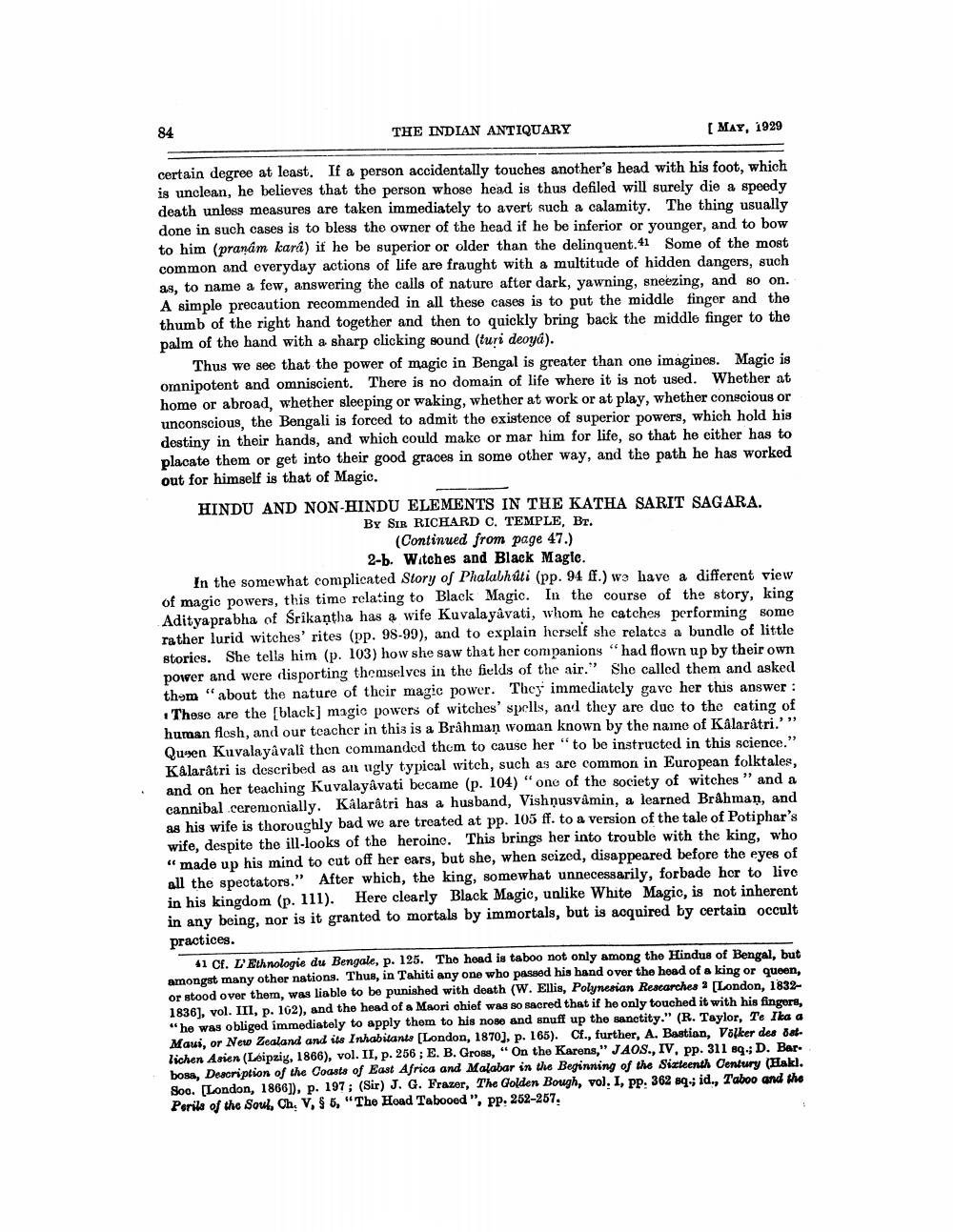________________
THE INDIAN ANTIQUARY
[ MAY, 1929
certain degree at least. If a person accidentally touches another's head with his foot, which is unclean, he believes that the person whose head is thus defiled will surely die a speedy death unless measures are taken immediately to avert such a calamity. The thing usually done in such cases is to bless the owner of the head if he be inferior or younger, and to bow to him (pranam kard) it he be superior or older than the delinquent.41 Some of the most common and everyday actions of life are fraught with a multitude of hidden dangers, such as, to name a few, answering the calls of nature after dark, yawning, sneezing, and so on. A simple precaution recommended in all these cases is to put the middle finger and the thumb of the right hand together and then to quickly bring back the middle finger to the palm of the hand with a sharp clicking sound (turi deoya).
Thus we see that the power of magic in Bengal is greater than one imagines. Magic is omnipotent and omniscient. There is no domain of life where it is not used. Whether at home or abroad, whether sleeping or waking, whether at work or at play, whether conscious or unconscious, the Bengali is forced to admit the existence of superior powers, which hold his destiny in their hands, and which could make or mar him for life, so that he either has to placate them or get into their good graces in some other way, and the path he has worked out for himself is that of Magic. HINDU AND NON-HINDU ELEMENTS IN THE KATHA SARIT SAGARA.
BY SIR RICHARD C. TEMPLE, Br.
(Continued from page 47.)
2-b. Witches and Black Magic. In the somewhat complicated Story of Phalabhati (pp. 94 ff.) w have a different view of magic powers, this time relating to Black Magic. In the course of the story, king Adityaprabha of Srikantha has a wife Kuvalayavati, whom he catches performing some rather lurid witches' rites (pp. 98-99), and to explain herself she relatos a bundle of little stories. She tells him (p. 103) how she saw that her companions "had flown up by their own power and were disporting themselves in the fields of the air." She called them and asked them "about the nature of their magic power. They immedintely gave her this answer :
These are the (black) magic powers of witches' spells, and they are due to the cating of human flesh, and our teacher in this is a Brâhman woman known by the name of Kalarâtri.'” Qu'en Kuvalayavali then commanded them to cause her "to be instructed in this science." Kalarâtri is described as an ugly typical witch, such as are common in European folktales, and on her teaching Kuvalayâvati became (p. 104) "one of the society of witches" and a cannibal ceremonially. Kalarâtri has a husband, Vishņusvåmin, a learned Brahman, and as his wife is thoroughly bad we are treated at pp. 105 ff. to a version of the tale of Potiphar's wife, despite the ill-looks of the heroine. This brings her into trouble with the king, who " made up his mind to cut off her ears, but she, when seized, disappeared before the eyes of all the spectators." After which, the king, somewhat unnecessarily, forbade her to live in his kingdom (p. 111). Here clearly Black Magic, unlike White Magic, is not inherent in any being, nor is it granted to mortals by immortals, but is acquired by certain occult practices.
41 Cf. L'Ethnologie du Bengale, p. 125. The head is taboo not only among the Hindus of Bengal, but amongst many other nations. Thus, in Tahiti any one who passed his hand over the head of a king or queen, or stood over them, was liable to be punished with death (W. Ellis, Polynesian Researches ? [London, 18321836). vol. III, p. 162), and the head of a Maori chief was so sacred that if he only touched it with his fingers, "he was obliged immediately to apply thom to his nose and snuff up the sanctity." (R. Taylor, Te Ika a Maui, or New Zealand and its Inhabitants [London, 1870), p. 165). Cl., further, A. Bastian, Volker des 80lichen Asien (Leipziy, 1866), vol. II, p. 256 ; E. B. Gross, “On the Karens," JAOS., IV. pp. 311 69.; D. Bar. bosa, Description of the Coasts of East Africa and Malabar in the Beginning of the Sixteenth Century (Hakl. Soc. (London, 1866]), p. 197; (Sir) J. G. Frazer, The Golden Bough, vol. I, pp. 362 sq.; id., Taboo and the Porila of the Soul, Ch. V, 95, "The Hoad Tabooed ", pp. 252-257,




